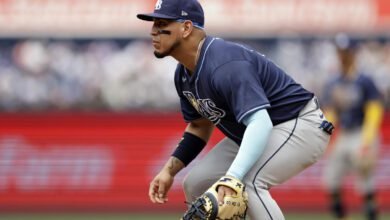Bill granting NCAA antitrust protection introduced in Congress


Two members of the U.S. House of Representatives on Wednesday introduced a bill that would give the NCAA, conferences and colleges the kind of protection from lawsuits they have been seeking as part of legislation aimed at creating federal rules regarding athlete compensation. and other college sports. matters.
The action by Rep. Russell Fry (R-S.C.) and Rep. Barry Moore (R-Ala.) comes against the backdrop of ongoing efforts to resolve a series of lawsuits against the NCAA and major conferences seeking billions of dollars in damages and contesting the association’s other rules regarding athletes’ compensation. ESPN and Yahoo! Sports reported on the deal negotiations last week.
In a press release, Fry and Moore — both members of the House Judiciary Committee — said their bill “is intended to accompany broader legislation that establishes a national framework that guarantees the right of student-athletes to receive compensation and set a federal standard with guardrails in place.”
For now, though, the only comprehensive bill introduced this session was introduced last July by Sens. Tommy Tuberville, R-Ala., and Joe Manchin, DW. Va. That bill didn’t gain traction. Draft bills for discussion were announced by Senator Ted Cruz (R-Tex.), Senators Cory Booker (DN.J.), Richard Blumenthal (D-Conn.), and Jerry Moran (R-Kan.), and by Rep. Gus Bilirakis (R-Florida). Cruz, Booker, Blumenthal and Moran have been trying to negotiate a compromise proposal. Cruz has also sought to provide a form of legal protection for the NCAA, conferences and schools.
Thus, the bill introduced Wednesday likely represents an effort by some members of the Republican-controlled House to make a statement about their position on broad-scale antitrust protection for the NCAA and its conferences and schools. Democrats in the House and Senate have so far shown little interest in providing such assistance.
The bill introduced Wednesday would prevent the NCAA, conferences and schools from being sued for:
▶”the adoption, agreement, application or enforcement of any rule or bylaw of” an association, conference or school “that limits or prohibits a student-athlete from receiving compensation from” an association, conference, school or other person or entity.
▶“restrict the [playing] eligibility of a student athlete who violates a school, conference or association rule.
▶“comply with an agreement, understanding, rule, or statute” adopted by a school, conference, association “(or a combination of conferences or institutions) that is reasonably contemplated by federal law.”
In February, NCAA President Charlie Baker told a small group of reporters in Washington about the need for a “very limited” form of legal protection. Other college sports players have repeatedly discussed what they say is the need for the association and schools to end exposure to lawsuits they have faced not just over athlete compensation, but also over transfer rules and schools’ ability to suspend athletes for violating the school and/or athletics department policies.
Some of these processes built on each other. For example, one of the pending lawsuits the NCAA is trying to resolve is seeking damages it claims are owed to athletes as a result of the Alston case that was decided by the Supreme Court.
Additionally, there are currently a number of different state laws regarding the ability of athletes to earn money from their name, image and likeness (NIL) through activities including sponsorship deals, public appearances, field operations and autograph signings. . About three weeks ago, Virginia Governor Glenn Youngkin (R) signed into law a bill that, starting July 1, will allow college athletes in the state to be paid directly by their schools for the schools’ use of NIL.
“The NIL rules are constantly changing, heavily litigated and essentially unenforceable – causing confusion and chaos for everyone involved,” Fry said in a statement. “We must establish a liability shield at the national level to protect schools, student-athletes and conferences as they navigate this new set of circumstances. This legislation is an integral component to saving college sports as we know it.”
Baker said in February about a possible antitrust exemption: “I would like something that is very limited here, and I’m perfectly happy to have some federal oversight with respect to that limitation. The kind of broad antitrust exemption that people have been talking about – I don’t think it’s necessary. I’m looking for something that takes away the uncertainty and chaos around some of the ground rules that are part of all of this.”



